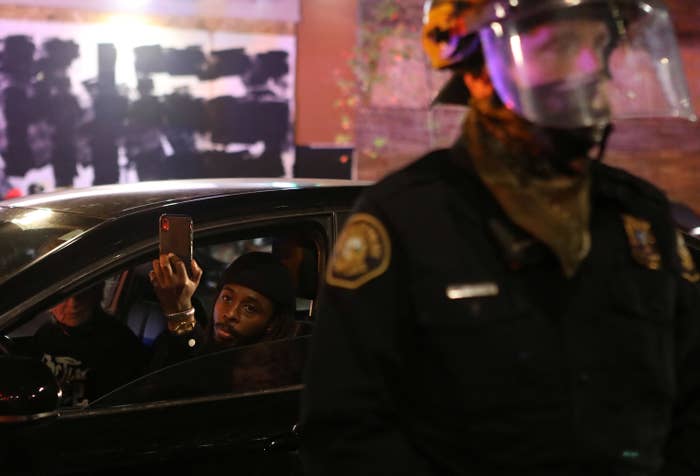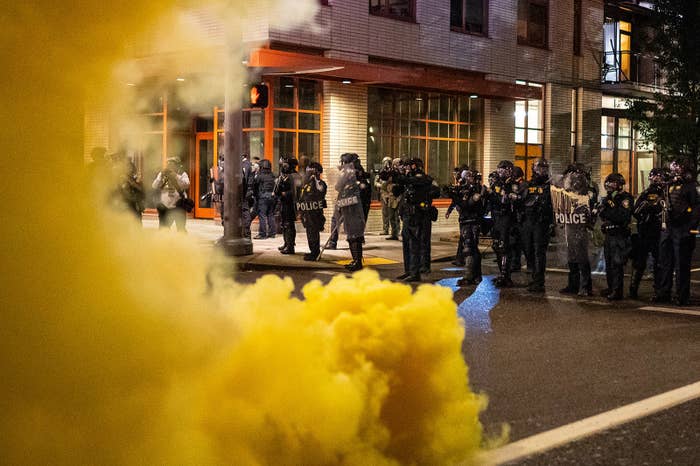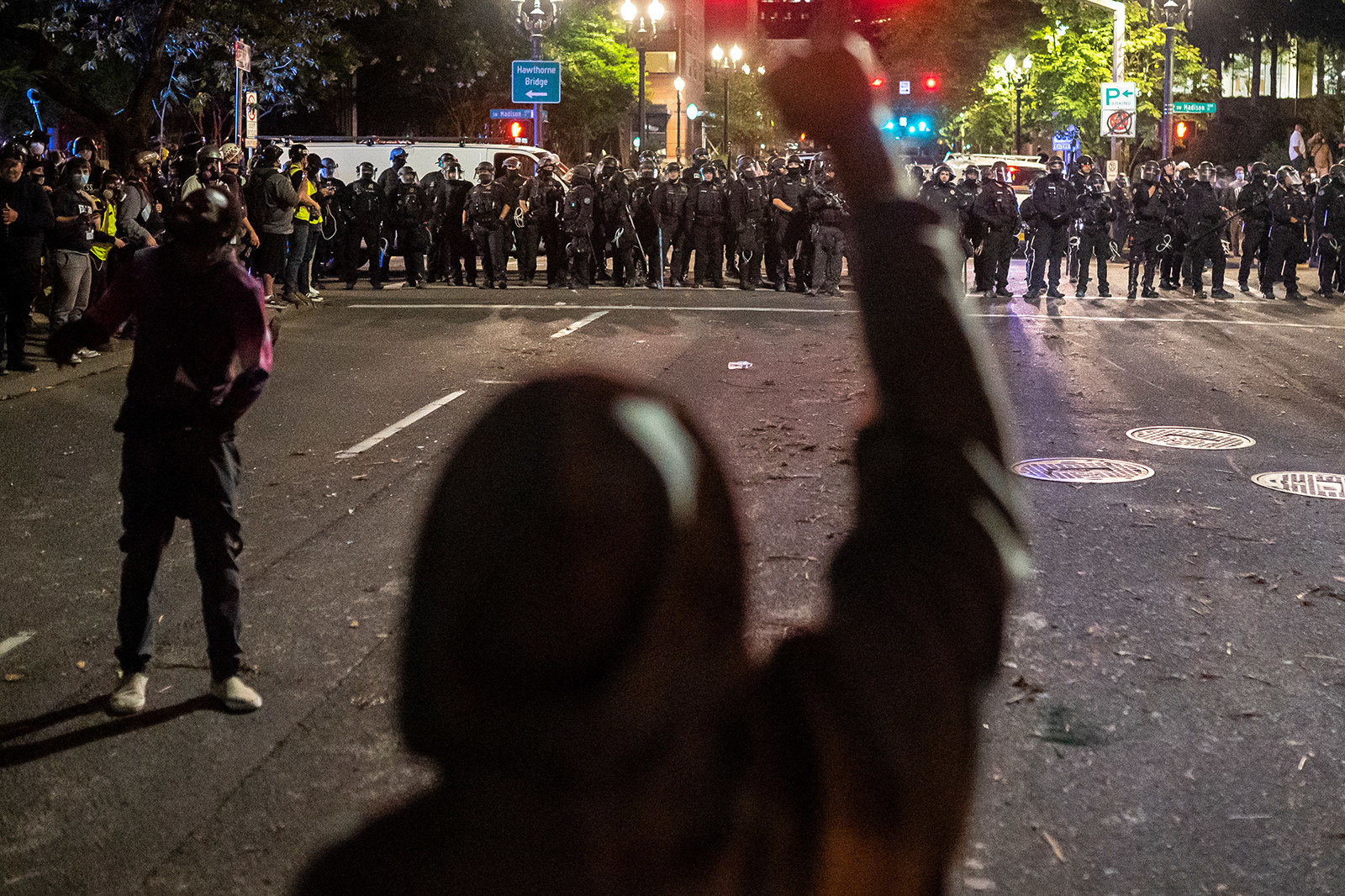
For all the challenges that Election Day 2020 may pose for towns and cities around the country, Portland, Oregon, has been dealt a wild card all its own: Amid unprecedented political strife, in September, US Marshals deputized more than than 50 of the city’s police officers, making them essentially federal officers. Now it’s not clear who they answer to.
The city’s mayor, Ted Wheeler, requested that the federal government “withdraw the designation” and return the officers to fully local control.
But the US attorney for Oregon, Billy Williams, refused, saying: “the federal deputation supports front line law enforcement officers and their families in a way that they have not seen from City Hall.”
The city has brought a lawsuit against the federal government, seeking an injunction to “immediately cancel the at-issue deputation” of city police.
A spokesperson for the Portland Police Bureau said they could not comment on the deputations because of pending litigation.
But one of Portland’s city commissioners, Jo Ann Hardesty, called the US attorney’s refusal to rescind the deputations “a clear attempt by the federal government to take over our local police force.” She said she plans to propose a resolution at a city council meeting this week that would formally prevent deputized officers from following federal commands.
Without clear answers, residents are left to speculate. “I would not be surprised to see the police department defy the orders of Ted Wheeler and start to use militaristic force against the people of Portland,” said Cameron Whitten, 29, founder of the racial justice nonprofit Brown Hope.

The roots of the current crisis go back to Portland’s summer of unrest. Near-daily protests, in which federal agents faced off against the mayor, and protesters brawled in the street, changed the image of a city formerly known for its laid-back culture and artisan-crafted everything.
On the heels of Donald Trump’s Fourth of July promise to defeat “the radical left,” the Department of Homeland Security poured into Portland.
The mayor, the governor, and the state’s two US senators opposed the mobilization. The state attorney general sought an injunction that would remove the federal officers from the city’s streets, but a federal judge rejected it.
Meanwhile, the protests grew more extreme. The police department was frequently overwhelmed, and in some cases did not intervene in protests, claiming “there were not adequate police resources available.”
Then, in September, the Proud Boys, a far-right extremist group, announced they were going to hold a demonstration in the overwhelmingly liberal city of Portland. With his police force already stretched thin, Wheeler, who under the city’s charter is traditionally also the police commissioner, asked for help from county and state police.
The county and state police said no. During the standoff with federal officials, the mayor had appeared to take the side of protesters, alienating police officials. The mayor had also banned the use of tear gas, and state police said they couldn’t control crowds at a protest without it.
With the Proud Boys, who have a history of instigating violence, planning to converge on the city, and counterprotesters gearing up to face off against them, Wheeler agreed to hand off operational control of the police department to a joint county and state command for the weekend. That decision proved to be fateful, because, in a surprise move, the state police turned to the US Marshals Service, asking it to federally deputize 56 city police officers and 22 county sheriff’s deputies.
In a Facebook post, the Oregon State Police explained that the intent of the move was to warn protesters that they could face much harsher federal legal penalties during demonstrations.
“I want violent individuals thinking about the enhanced penalties they may face if they harm a Portland Police Bureau Officer,” said Superintendent Travis Hampton, who retires on November 1, just two days before Election Day.

After the Proud Boys demonstration, which ended largely without violence, operational control of the police department was returned to Wheeler’s command. The US Marshal’s deputation, however, remained in effect through the end of 2020, according to the police spokespeople. This was news to the mayor: a spokesperson for Wheeler said he had expected the federal influence to end after the Proud Boys event.
The mayor told Oregon Public Broadcasting, it was a “fiat by the federal government.”
If Wheeler was annoyed, activists and civil rights leaders were downright afraid. Juan Chavez, a civil rights lawyer with the Oregon Justice Resource Center, called the deputized officers “a rogue branch,” saying, “We don't know who these [officers] will feel loyal to if ordered to do something after the election.”
An Oregon State Police spokesperson said that their own federal deputation does not affect the chain of command, but others are less sure. The mayor’s office directed questions to city police, who directed questions to the US attorney. The US attorney directed questions to the US Marshals, who referred BuzzFeed News to US Attorney Williams’ previously released statement that said Oregonians “are sick of the boarded-up and dangerous conditions prevalent in downtown Portland due to a lack of leadership.” The US Marshals Office did not answer questions about who is authorized to issue orders to city police, saying: “It depends.”
Earlier this month, the city of Portland sued the Justice Department to regain control of its officers, accusing the federal government of putting in place an “unconstitutional” and “unlawful practice in Portland of commandeering control of local law enforcement officers in direct contravention of the City’s express revocation of consent, and for unknown or pretextual ends.”
In a statement, Wheeler said, “There is no place in our American constitutional system for the federal government to insert itself into Portland’s decisions about how local police respond to public demonstrations on our city streets.”
Now, Wheeler is going back to the negotiating table with county and state police. He’ll need their help again to manage the demonstrations around the general election. The last time he negotiated with these departments, they got his officers deputized under his nose. This time, nobody’s sure how it’ll turn out.
Andre Miller, 37, who said he was hit in the head with “some kind of crowd control munition” this summer while protesting and had “concussion-like symptoms” for five weeks afterward, called the latest development “scary.”
“Our own city officials don’t know what’s going on,” he said.
